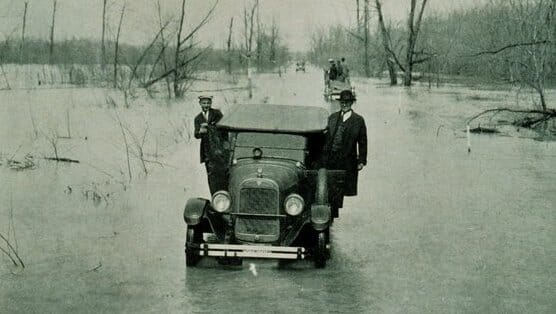The Tilted World by Tom Franklin and Beth Ann Fennelly

On August 29th, 2005, my husband and I were transplanted Southerners living in Chicago. That day, Hurricane Katrina struck the Gulf Coast.
We know the facts well at this point. The storm surge caused the region’s levees to collapse. Water engulfed New Orleans, and Mississippi and other Southern states experienced massive flooding.
I sat glued to the TV for hours as fresh horrors unfolded: people rescued from rooftops by boat or by helicopter; miles of evacuees stuck in traffic going nowhere; general looting; evacuation of Memorial Medical Center; the suffering of displaced families sheltered in the Superdome.
At the time, Michael Chertoff, then Homeland Security Secretary, said, “… [t]his is probably the worst catastrophe or set of catastrophes … that I’m aware of in the history of the country, a devastating hurricane followed by a second devastating flood.”
Amazingly, Chertoff got it wrong.
Katrina’s antecedent, The Great Flood of 1927, holds an unchallenged place as the worst natural disaster the United States ever experienced. It changed not only the geographical landscape of the country from Illinois to Mississippi but the country’s social and political trajectory as well.
Descriptions of the enormity of the flood’s damage—even accurate ones—seem hyperbolic. The turgid Mississippi broke out of its banks in dozens of places. The worst damage occurred in mid-April at Mounds Landing, a known weak spot in the levee system, where water roared through a mile-wide crevasse at a volume and force comparable to Niagara Falls. In some places, the Mississippi stretched 80 miles wide. It covered more than 27,000 square miles—an area the size of New England.
Within this largely unremembered, deeply foreshadowing historical event, husband-and-wife writer team Tom Franklin and Beth Ann Fennelly have set their fictional drama, The Tilted World. At its heart, the story portrays the late 1920s Prohibition Era through the alternating narratives of two protagonists, Teddy Ingersoll and Dixie Clay.
Ingersoll—a bit of a daydreamer, a WWI veteran, a musically talented hobbyist, and a Prohibition revenue agent—arrives in the town of Hobnob, Miss., with his partner. They are tasked, at the behest of Commerce Secretary Herbert Hoover (who has designs on the White House), to discover and arrest the region’s most notorious bootlegger, the maker of Black Lightning.
Ingersoll encounters Dixie Clay, an isolated and neglected young woman who unwisely wed a charming scoundrel at the age of 16 and lost their baby to scarlet fever at 18. In her future she sees only “work and more work until she die[s]. So far, she hadn’t been wrong.” Dixie Clay also happens to be the bootlegger Ingersoll seeks. A “shiner” in earnest, she cooks up the region’s best moonshine—Black Lightning—and she experiments with flavor infusions and recipes like a mixologist in a modern tippling room.
These individuals come together over Willy, an infant suddenly orphaned by a robbery attempt gone wrong. Ingersoll, an orphan himself, sees a chance to help a helpless baby avoid the troubles he has endured in his own life. For Dixie Clay, Willy represents a second chance at motherhood. The pull between the two adults builds in slow, inexorable intensity, rising just like the floodwaters of the Mississippi River.
-

-

-

-

-

-

-

-

-

-

-

-

-

-

-

-

-

-

-

-

-

-

-

-

-

-

-

-

-

-

-

-

-

-

-

-

-

-

-

-








































